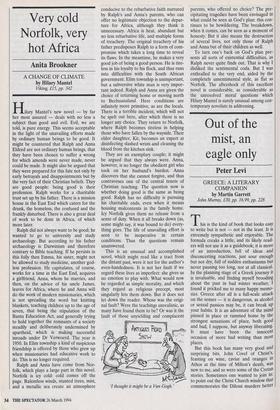Out of the mist, an eagle only
Peter Levi
GREECE: A LITERARY COMPANION by Martin Garrett John Murray, £30, pp. 16.99, pp. 228 This is the kind of book that looks easy to write but is not — not in the least. It is extremely sympathetic and enjoyable. The formula creaks a little, and its likely read- ers will not use it as a guidebook; it is more of an introduction, full of ideas and disconcerting reactions, just sour enough but not dry, full of sudden enthusiasms but never pausing too long, not at all classical. In the planning stage of a Greek journey it is invaluable, and finding myself brooding about the past in bad winter weather, I found it pricked me to many happy memo- ries. Greece after all is a full-scale attack on the senses — it is dangerous, as alcohol or sexual passion may be, it can break up your habits. It is an adventure of the mind pinned in place or rammed home by the strongest sensations of place, both good and bad, I suppose, but anyway liberating. It must have been the innocent occasion of more bad writing than most places. But this book has many very gbod and surprising bits. John Covel of Christ's, feasting on wine, caviar and oranges in Athos at the time of Milton's death, was new to me, and so were some of the Cretan stories. Sometimes one wanted to join in: to point out the Christ Church window that commemorates the Dilessi murders better than the glass in Athens, being by Burne- Jones, or to plead for a mention of Miss Benton on Ithaca, but then one remem- bered that her life has not been written, only affectionately remembered in conver- sations.
That is all that is missing. Even in Athens the book gives no conversations, and the world of Ketsimbalis, Gatsos, Ghika, and many others is lost: the world of cafés, and of all the writers and artists back to Papa- diamantis. It is filtered here through travel writers, like the one who reported that when real eagles swooped over Prometheus in the Thirties in the theatre at Delphi 'some say' there was thunder. Witnesses told me there was a terrific thunderstorm for 20 minutes, the play had to stop, people were drenched, and then out of the last of the mist floated an eagle. As for Miss Ben- ton, she is neglected because British archaeologists are set aside. It seems a pity that there is not enough of Dilys Powell. It is just that world since the Thirties which is fading now and even seems a little neglect- ed: yet the book is worth buying if only for the two brilliant halves of a cover picture by John Craxton (c.1960?). How did they dare to cut it in half?
It is silly to be querulous. I have not read any book so avidly for years, and a very happy day I had doing so. It is a spirited, sparkling performance, and I wish it were much longer. Is Durrell's poetry out of fashion? I know Falconer's must be, but 200 years make up a long time. The trouble is that there is so much material it must have been painful to select. It is fair to say that Athens, where Martin Garrett is forced to go round monuments like a real guide book, is the dullest chapter, so per- haps it should have come last. One of the best is, of all places, Athos, but the smallest of enigmatic islands have been most loving- ly treated: Paxos gleams, Kythera is fully documented, and no Turkish barbarity and it seems no Byzantine hierarch is omitted, though Phrantzis, eyewitness of the fall of Istanbul to the Turks, died in Corfu, and Meander Nucius who fought the Scots under Henry VIII came from there — and the Jewish Duchy of Naxos is another opportunity missed. It is relevant to the colony of Jews at Salonilci, whom the Germans in the end packed into a rusty old boat and then sank, and to the White Tower, which had, I believe, Italian architects, just as the Duke of Naxos was commemorated on a superb renaissance medal. The book about him is by Cecil Roth, but as I just said, there is too much material.
Those who come surprisingly well out of their citations in the book are Osbert Lancaster and Stephen Spender, an unlike- ly couple, and Peter Hall is at least as unlikely: intelligence and enthusiasm and a certain bite is what they all have in com- mon. Robert Byron and Evelyn Waugh do better still, but that is no surprise. William Golding is always excellent value, on the page as in life. Patrick White describes an evening eating fish fairly competently. What I really could not swallow was Kazantzakis, who is unreliable as a witness and a belly-ache as a writer. Martin Garrett also wobbled I thought about Sappho: he was sensible to exclude most ancient authors. But some history of what happened at Psari and at Souli in the 19th century, and of the Greek wars since then should be recommended. Without reading that, readers of this book will never under- stand the Macedonian question, and had better keep their mouths shut if they do go to Greece.
Let me explain about Miss Benton. She read the Odyssey and learnt to sail a dinghy as a child at Lossiemouth in the early years of this century, and much later she suddenly inherited money and went out to Greece as an archaeologist. She found a lovely sixth-century lion built into the quay at Kythera, which she made them dismantle. At Ithaca she decided Odysseus had left his treasure in a cave and it must still be there. The director of the dig told her to go off and look, thus thinking to be rid of her. She promptly swam into a cave and discovered a hoard of bronze tripods, very nice too, while the official dig found nothing. After the earthquake at Ithaca she commandeered a destroyer and was the first outsider to lahd, the Greek navy being justifiably frightened of more quakes. She used the main road to lay out and sort the island's archaeological treasures. Later on there was an epic war with a local school- master, who impounded some striped measuring rods she had in store, for use in pole-vaulting in the school sports. On a climb up Parnassos she is said tranquilly to have pushed her guide over a cliff for molesting her. She cuddled a mastiff to keep warm. They are not making ladies like that any more. I wish she had floated out of the mist into this book, where she would have melted into the landscape indistin- guishably. Never in my life have I had such a feast of favourite stories.
The only real plum Martin Garrett seems to have missed is Richard Monkton Milnes, who Tennyson said went around Greece like an iridescent soap bubble. The travel book he wrote about it was in verse, some of it charming, and as he had been to visit Goethe he included a translation of one of the old man's epigrams into English heroic couplets. He is also notable for his extreme dislike of the ruined temple at Corinth — those huge, harmonious pillars. He supposed they were so ugly the ancients must have seen something numinous about them. Monkton MiInes was an extremely cheeful man and I only wish they would publish his diaries, which are now at Trinity, where he was Tennyson's friend, but his handwriting is so bad that he is unlikely to attract purely aesthetic or literary researchers, much as they might enjoy him.



























































 Previous page
Previous page